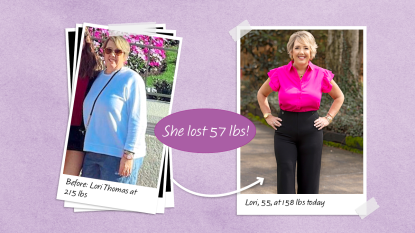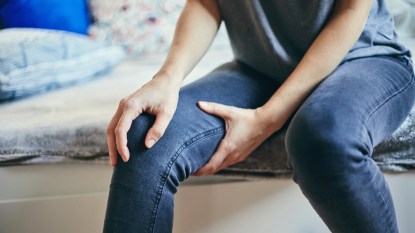Top Doc Explains How to Outsmart the Hidden Downside of Rapid Weight Loss: Gallstones
Must-read info for anyone who's considering the keto diet and/or intermittent fasting
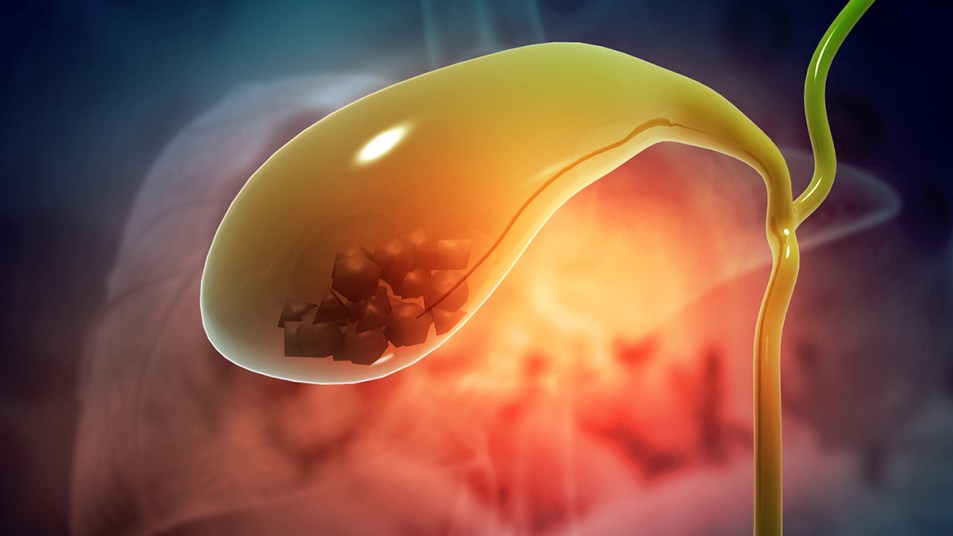
It never stops feeling amazing to see the results of your weight loss effort: Fitting into clothes you haven’t worn in years, feeling more confident when you look in the mirror, enjoying a surge in energy and mood. But sometimes, unexpected health issues like gallstones can throw a wrench into your progress. The good news is you can prevent gallstones during weight loss. With a few easy study-proven tricks, you can nip the problem in the bud without derailing your hard-earned success.
What is the gallbladder?
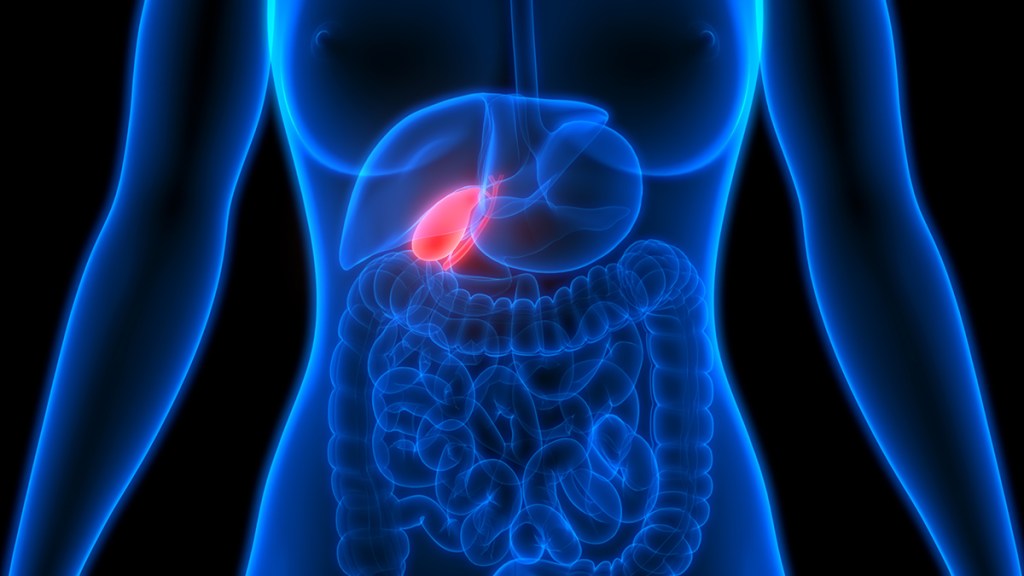
Although we rarely think of the gallbladder — a small, pear-shaped organ about the size of a small chicken egg located beneath your liver — it plays a key role in helping your body to break down fats. It does this job by storing and concentrate bile, which is a greenish-brown liquid produced by the liver that helps break down fats in the food we eat.
Bile is like a detergent for fats: It helps to break them into tiny droplets, making it easier for the digestive enzymes to do their work. “When we eat fatty foods, the gallbladder squeezes bile into the small intestines to break down fat,” explains gastroenterologist Peyton Berookim, MD.
What are gallstones?
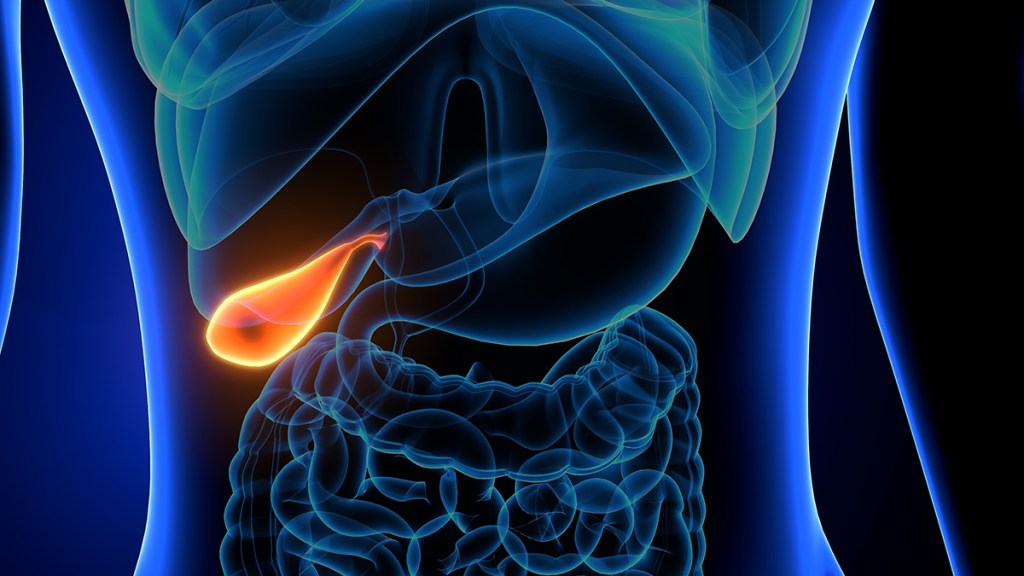
Gallstones form when your gallbladder fails to completely empty and/or when there is too much cholesterol in your bile. Both of these things can be a consequence of the gallbladder becoming overtaxed from processing too much fat and cholesterol. The stones themselves are hard, pebble-like clumps of cholesterol (which account for 80% of all gallstones) or bilirubin (which account for the other 20% of all gallstones). Gallstones can vary in size, ranging from as small as a grain of sand to as large as a golf ball. The larger they are, the more likely they are to cause painful symptoms.
What are the symptoms of gallstones?
The most common signs of gallstones are abdominal pain (usually in the upper-right area of your abdomen), nausea, vomiting, and upper back pain. However, nearly 66% of gallstones are actually asymptomatic — in fact, researchers have dubbed them “silent gallstones”. This means it’s possible to develop gallstones without even realizing it.
Generally, experts say silent gallstones don’t need to be treated. But those causing pain mean they’re likely blocking bile flow, which can be problematic. Doctors can confirm a diagnosis using imaging tests such as an ultrasound, CT scan or MRI.
What causes gallstones?
The two most common causes of gallstones are obesity and rapid weight loss. How’s that for irony? Folks who are carrying extra pounds (with a body mass index over 30) usually have higher levels of cholesterol in the blood. That’s can be a problem since bile is made up chemicals such as lecithin and bile salts that break down cholesterol. When too much cholesterol builds up in your bile, it can put a strain on your gallbladder and trigger the formation of stones.
Weight loss, specifically rapid weight loss, is the other main cause of gallstones. If you’ve recently had weight-loss surgery or follow a low-calorie/high-fat or fasting diet, your risk of gallstones is increased. Why? Steven Batash, MD, explains that accelerated weight loss causes the body to release extra cholesterol into bile. Oftentimes the gallbladder struggles to keep up with the increased demand on the organ, upping the risk of stones.
Other risk factors for developing gallstones include being a woman (women are up to three times as likely to develop stones as men), having a family history, genetic predisposition, and being 40 or older.
How a Keto diet increases gallstone risk
If you follow a Keto diet, you know the perks: reduced appetite, decreased food cravings, and of course, fast weight loss! (If you’re new to Keto and want to find out more, click through to discover some beginner-friendly Keto diet tweaks)
However, the Keto diet and other similar high-fat, low-carb diets raise the risk of gallstones by flooding your gallbladder with more cholesterol than it can process. What’s more, Dr. Batash cautions that the high fat content of a keto diet can make gallstones more likely.
How intermittent fasting increases gallstone risk
Another popular eating plan that can trigger stone formation: Intermittent fasting, in which you cycle between periods of eating and fasting. This type of diet can strain the organ in a different way. Fasting slows gallbladder movement. That means cholesterol spends more time accumulating in the gallbladder before the organ can flush it out, triggering stone formation.
The 9 best ways to prevent gallstones during weight loss
If you’ve been working hard to lose weight, the last thing you want to deal with is gallstones. That’s why we’ve rounded up the most effective, study-backed strategies that can stop stones from ever forming and prevent silent gallstones from growing and becoming problematic.
1. Increase your intake of vitamin C
Or pile more veggies on your salad. Every tasty bite you enjoy helps block gallstones. Research in BMC Gastroenterology suggests increasing your intake of vitamin C found in foods like tomatoes, bell peppers, strawberries and grapefruit may reduce gallstone risk by as much as 66%.
Vitamin C helps convert cholesterol into bile, preventing it from collecting in the gallbladder. And researchers found the longer you keep your C levels up, the further your risk of gallstones plunges. Just one ½ cup of sweet red pepper has 106% of the 75 mg. of vitamin C you need daily.
2. Take time to relax
Bookworms, take note: Losing yourself in the latest bestseller can reduce your likelihood of experiencing gallstones by as much as 63%. That’s the word from researchers reporting in the Indian Journal of Community Medicine, who found that taking 30 minutes to relax daily reduces stress hormone production that can cause stone-forming cholesterol levels to climb.
3. Savor a glass of wine
Permission to sip some vino with dinner. Turns out drinking 6 oz. of wine daily lessens gallstone risk 32%, researchers at the University of East Anglia say. They explain that moderate amounts of alcohol help the gallbladder empty so its contents don’t linger and form stones. Also smart: reaching for a cup of coffee. A separate Harvard University study found folks who drank 2 to 3 cups of coffee daily experienced a similar benefit.
4. Get regular exercise
Just 20 minutes of easy-to-do activities like pickleball, dancing or strolling reduces gallstone risk by 37%, research in Preventative Medicine reveals. Experts explain that regular exercise lowers levels of mucin, a protein that encourages formation of stones. Plus, it encourages the gallbladder to empty and refill, which helps ward off stone-forming cholesterol build up.
5. Stay hydrated
Drinking plenty of fluids can help flush the buildup of bile and cholesterol out of the gallbladder, says Heather Moday, MD, director of the Moday Center in Philadelphia. The hitch: Many of us are chronically dehydrated, and even a small dip in fluid levels can tax the gallbladder.
Dr. Moday says a good goal is to try to drink half your body weight in ounces of water daily. For an easy reminder, consider a motivational water bottle. They have encouraging phrases like “You’ve got this!” and “Keep chugging!” printed on the bottle alongside ounce markers to help make sure you’re hitting your goal.
6. Nosh on nuts
Enjoy a handful of peanuts, cashews or other nuts daily and your gallstone risk could plummet by 30%, say researchers reporting in the American Journal of Epidemiology. Credit goes to nuts’ combo of healthy fats and fiber, which keep stone-forming cholesterol in check.
7. Try a ‘metabolixir’
To keep your gallbladder functioning at its peak, whip up a ‘Metabolixir’ mocktail. “Bitters are your gallbladder’s best friend,” says Anne Louise Gittleman, PhD. “These plant tinctures stimulate the release of bile and are best taken before a meal.”
To do: Mix 1/4 cup of water, 1 Tbs. of apple cider vinegar, 1/4 tsp. of digestive bitters, 1/4 tsp. of ground ginger, 1/8 tsp. of cayenne and 1 drop of stevia. Tip: “Don’t overdo the sweetener,” Gittleman says. “You must be able to taste the bitters for them to stimulate those digestive juices to get your gallbladder contracting.”
8. Drizzle on olive oil
Topping roasted veggies, salads, and even pasta with olive oil can keep gallstones at bay. Healthy fats like extra-virgin olive oil trigger the gallbladder to release bile, says David Rakel, M.D., director of the integrative medicine program at the University of Wisconsin at Madison. “Without fat to trigger this release, bile can stagnate, so stones are more likely to form.”
9. Consider supplementing with bergamot extract
Keeping your cholesterol in check noticeably lessens your gallstone risk. An easy way to do so: Taking 500 to 1,000 mg. of bergamot extract, the citrus compound that gives Earl Grey tea its flavor, daily. This lowers your cholesterol as effectively as statins in one month, suggests research in Critical Reviews in Food Science and Nutrition. One to try: NAOMI Italian Citrus Bergamot (Buy from NaomiW.com, $35).
For tips on getting started on keto or intermittent fasting, check out these stories:
- 5 Easy Keto-Friendly Diet Tweaks to Kickstart Fat Burning and Weight Loss
- “I’m 71, and Intermittent Fasting Saved Me From a Wheelchair — Plus I Lost 121 Pounds!”
- A Health Journalist Against Restrictive Diets Became an Intermittent Fasting Believer After 30 Days — Here’s Why
This content is not a substitute for professional medical advice or diagnosis. Always consult your physician before pursuing any treatment plan.
A version of this article originally appeared in our print magazine, Woman’s World.







